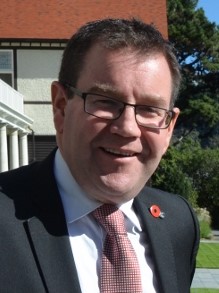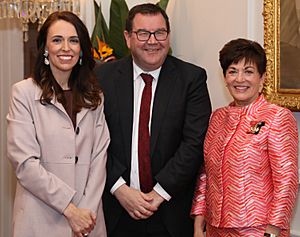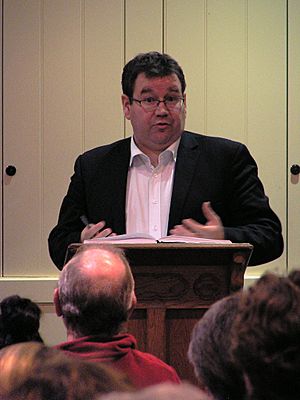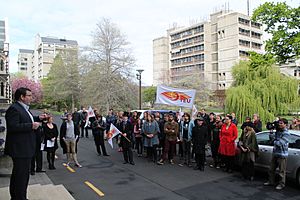Grant Robertson facts for kids
Quick facts for kids
Grant Robertson
|
|||||||||||||||||||||||||||||||||||||||||||||||||||||||
|---|---|---|---|---|---|---|---|---|---|---|---|---|---|---|---|---|---|---|---|---|---|---|---|---|---|---|---|---|---|---|---|---|---|---|---|---|---|---|---|---|---|---|---|---|---|---|---|---|---|---|---|---|---|---|---|

Robertson in 2023
|
|||||||||||||||||||||||||||||||||||||||||||||||||||||||
| 10th Vice-Chancellor of the University of Otago | |||||||||||||||||||||||||||||||||||||||||||||||||||||||
| Assumed office 1 July 2024 |
|||||||||||||||||||||||||||||||||||||||||||||||||||||||
| Chancellor | Stephen Higgs | ||||||||||||||||||||||||||||||||||||||||||||||||||||||
| Preceded by | David Murdoch | ||||||||||||||||||||||||||||||||||||||||||||||||||||||
| 19th Deputy Prime Minister of New Zealand | |||||||||||||||||||||||||||||||||||||||||||||||||||||||
| In office 6 November 2020 – 25 January 2023 |
|||||||||||||||||||||||||||||||||||||||||||||||||||||||
| Prime Minister | Jacinda Ardern | ||||||||||||||||||||||||||||||||||||||||||||||||||||||
| Preceded by | Winston Peters | ||||||||||||||||||||||||||||||||||||||||||||||||||||||
| Succeeded by | Carmel Sepuloni | ||||||||||||||||||||||||||||||||||||||||||||||||||||||
| 29th Minister of Foreign Affairs | |||||||||||||||||||||||||||||||||||||||||||||||||||||||
| In office 11 November 2023 – 27 November 2023 |
|||||||||||||||||||||||||||||||||||||||||||||||||||||||
| Prime Minister | Chris Hipkins | ||||||||||||||||||||||||||||||||||||||||||||||||||||||
| Preceded by | Nanaia Mahuta | ||||||||||||||||||||||||||||||||||||||||||||||||||||||
| Succeeded by | Winston Peters | ||||||||||||||||||||||||||||||||||||||||||||||||||||||
| 12th Minister of Disarmament and Arms Control | |||||||||||||||||||||||||||||||||||||||||||||||||||||||
| In office 11 November 2023 – 27 November 2023 |
|||||||||||||||||||||||||||||||||||||||||||||||||||||||
| Prime Minister | Chris Hipkins | ||||||||||||||||||||||||||||||||||||||||||||||||||||||
| Preceded by | Nanaia Mahuta | ||||||||||||||||||||||||||||||||||||||||||||||||||||||
| Succeeded by | Office abolished | ||||||||||||||||||||||||||||||||||||||||||||||||||||||
| 42nd Minister of Finance | |||||||||||||||||||||||||||||||||||||||||||||||||||||||
| In office 26 October 2017 – 27 November 2023 |
|||||||||||||||||||||||||||||||||||||||||||||||||||||||
| Prime Minister | Jacinda Ardern Chris Hipkins |
||||||||||||||||||||||||||||||||||||||||||||||||||||||
| Preceded by | Steven Joyce | ||||||||||||||||||||||||||||||||||||||||||||||||||||||
| Succeeded by | Nicola Willis | ||||||||||||||||||||||||||||||||||||||||||||||||||||||
| 12th Leader of the House | |||||||||||||||||||||||||||||||||||||||||||||||||||||||
| In office 1 February 2023 – 27 November 2023 Acting: 25 January 2023 – 1 February 2023 |
|||||||||||||||||||||||||||||||||||||||||||||||||||||||
| Prime Minister | Chris Hipkins | ||||||||||||||||||||||||||||||||||||||||||||||||||||||
| Preceded by | Chris Hipkins | ||||||||||||||||||||||||||||||||||||||||||||||||||||||
| Succeeded by | Chris Bishop | ||||||||||||||||||||||||||||||||||||||||||||||||||||||
| 11th Minister for Sport and Recreation | |||||||||||||||||||||||||||||||||||||||||||||||||||||||
| In office 26 October 2017 – 27 November 2023 |
|||||||||||||||||||||||||||||||||||||||||||||||||||||||
| Prime Minister | Jacinda Ardern Chris Hipkins |
||||||||||||||||||||||||||||||||||||||||||||||||||||||
| Preceded by | Jonathan Coleman | ||||||||||||||||||||||||||||||||||||||||||||||||||||||
| Succeeded by | Chris Bishop | ||||||||||||||||||||||||||||||||||||||||||||||||||||||
|
|||||||||||||||||||||||||||||||||||||||||||||||||||||||
| Member of the New Zealand Parliament for Wellington Central |
|||||||||||||||||||||||||||||||||||||||||||||||||||||||
| In office 8 November 2008 – 14 October 2023 |
|||||||||||||||||||||||||||||||||||||||||||||||||||||||
| Preceded by | Marian Hobbs | ||||||||||||||||||||||||||||||||||||||||||||||||||||||
| Succeeded by | Tamatha Paul | ||||||||||||||||||||||||||||||||||||||||||||||||||||||
| Member of the New Zealand Parliament for Labour party list |
|||||||||||||||||||||||||||||||||||||||||||||||||||||||
| In office 14 October 2023 – 22 March 2024 |
|||||||||||||||||||||||||||||||||||||||||||||||||||||||
| Succeeded by | Glen Bennett | ||||||||||||||||||||||||||||||||||||||||||||||||||||||
| Personal details | |||||||||||||||||||||||||||||||||||||||||||||||||||||||
| Born |
Grant Murray Robertson
30 October 1971 Palmerston North, New Zealand |
||||||||||||||||||||||||||||||||||||||||||||||||||||||
| Political party | Labour | ||||||||||||||||||||||||||||||||||||||||||||||||||||||
| Spouse |
Alf Kaiwai
(m. 2009) |
||||||||||||||||||||||||||||||||||||||||||||||||||||||
| Residence | Northland, Wellington | ||||||||||||||||||||||||||||||||||||||||||||||||||||||
| Alma mater | University of Otago | ||||||||||||||||||||||||||||||||||||||||||||||||||||||
Grant Murray Robertson (born 30 October 1971) is a New Zealand politician who was a member of the Labour Party. He served as the Minister of Finance from 2017 to 2023. He was also the 19th Deputy Prime Minister of New Zealand from 2020 to 2023. He was a Member of Parliament (MP) for Wellington Central from 2008 to 2023.
After leaving politics in March 2024, Robertson became the Vice-Chancellor of the University of Otago on 1 July 2024. As Finance Minister, he played a big role in the government's economic plans, especially during the COVID-19 pandemic in New Zealand.
Contents
Early Life and Education
Grant Robertson was born in Palmerston North, New Zealand, on 30 October 1971. He was the youngest of three brothers. His family lived in Hastings before moving to South Dunedin. His mother, Yvonne Wilkie, became a teacher. His father, Douglas Robertson, was an accountant. Grant had a paper delivery job as a boy. At 16, he worked at a New World supermarket in Dunedin, helping with fruits and vegetables.
Robertson went to King's High School in Dunedin, where he was the head boy. He then studied political science at the University of Otago. He earned a Bachelor of Arts with honours in 1995. He was the President of the Otago University Students' Association in 1993. He also served as co-president of the New Zealand University Students' Association in 1996. Grant was interested in politics from a young age. He admired former prime minister David Lange.
Professional Career
After university, Grant Robertson joined the Ministry of Foreign Affairs and Trade (MFAT) in 1997. He worked overseas, including at the United Nations in New York. He also managed New Zealand's aid program to Samoa. This program helped with things like education, healthcare, and supporting small businesses. He left MFAT in 2001.
Robertson returned to New Zealand to work as an advisor for government ministers. He advised Marian Hobbs, who was the Minister for the Environment. Later, he advised Prime Minister Helen Clark. In this role, he helped connect the Prime Minister's office with smaller parties that supported the government. He also helped create Labour's interest-free student loans policy. This policy was seen as important in helping Labour win the election.
After the 2005 election, Robertson worked as a senior research marketing manager for the University of Otago. He was based at the Wellington School of Medicine.
Political Journey
| New Zealand Parliament | ||||
| Years | Term | Electorate | List | Party |
| 2008–2011 | 49th | Wellington Central | 46 | Labour |
| 2011–2014 | 50th | Wellington Central | 14 | Labour |
| 2014–2017 | 51st | Wellington Central | 3 | Labour |
| 2017–2020 | 52nd | Wellington Central | 4 | Labour |
| 2020–2023 | 53rd | Wellington Central | 3 | Labour |
| 2023–2024 | 54th | List | 4 | Labour |
Becoming a Member of Parliament
In 2006, the MP for Wellington Central, Marian Hobbs, announced she would retire. Grant Robertson was chosen to run for the Labour Party in that area. He focused his campaign on local issues. In the 2008 New Zealand general election, Robertson won the Wellington Central seat. He defeated the National Party candidate, Stephen Franks, by 1,904 votes.
First Term in Opposition (2008–2011)
After the 2008 election, the Labour government was defeated. Grant Robertson became a spokesperson for the opposition. He spoke on topics like state services, arts, culture, heritage, and foreign affairs. In 2010, he introduced a bill about ethical investment for government funds, but it did not pass.
In 2010, he was promoted to be the spokesperson for tertiary education. In 2011, he was further promoted to the front bench, taking on the health portfolio.
Second Term and Deputy Leader (2011–2014)
In the 2011 New Zealand general election, Robertson won his Wellington Central seat again. After the election, he was elected as the new Deputy Leader of the Labour Party. He worked alongside the party leader, David Shearer. In this role, he also spoke on employment, skills, training, and arts, culture, and heritage.
Third Term and Finance Spokesperson (2014–2017)

Grant Robertson won his Wellington Central seat for a third time in the 2014 New Zealand general election. After this election, he became the Labour Party's spokesperson for finance. This meant he was the main person speaking about the party's economic plans. He also chaired the Labour Party's "Future of Work Commission," which looked into how jobs might change in the future.
Minister of Finance (2017–2023)
In the 2017 New Zealand general election, Robertson won his Wellington Central seat again. After the election, the Labour Party formed a government with other parties. Grant Robertson was chosen by Prime Minister Jacinda Ardern to be the Minister of Finance. This was a very important role. He also became the Minister for Sport and Recreation and an associate Minister for Arts, Culture and Heritage.
In 2019, he also became the Minister Responsible for the Earthquake Commission. As Finance Minister, Robertson worked closely with Prime Minister Ardern. He often helped lead press conferences during the government's response to COVID-19.
Deputy Prime Minister (2020–2023)

In the 2020 New Zealand general election, Labour won a large victory. Grant Robertson won his Wellington Central seat by a big margin. After the election, he was appointed the 19th Deputy Prime Minister by Prime Minister Ardern. He continued to be the Minister of Finance and Minister for Sport and Recreation. He also took on new roles as Minister for Infrastructure and Minister for Racing.
When Prime Minister Jacinda Ardern resigned in January 2023, Robertson announced he would not seek to become the new Prime Minister. He stepped down as Deputy Prime Minister but continued as Finance Minister. He also became the Leader of the House and, after Cyclone Gabrielle, the Minister for Cyclone Recovery. For a short time in November 2023, he was also the Minister of Foreign Affairs.
Leaving Politics (2023–2024)
In the 2023 New Zealand general election, Grant Robertson chose not to run for the Wellington Central seat. Instead, he ran as a list-only candidate and was re-elected as a list MP. On 30 November 2023, he became the finance and racing spokesperson for the Labour Party in opposition.
On 5 December 2023, he was allowed to keep the title The Honourable. This was in recognition of his time serving in the government. On 20 February 2024, Robertson announced he would retire from politics in March 2024. He was taking on a new job as the Vice-Chancellor of the University of Otago.
University of Otago Vice-Chancellor
Grant Robertson officially started his role as Vice-Chancellor of the University of Otago on 1 July 2024. The university council fully supported his appointment. While some people supported his new role, others were unsure because he came from a political background, not an academic one.
In November 2024, Robertson announced that he would personally fund seven scholarships. These scholarships are worth NZ$7,000 each year. They are for first-year Otago students who have received an Otago equity scholarship and need financial help.
See also
- Electoral history of Grant Robertson
 | Emma Amos |
 | Edward Mitchell Bannister |
 | Larry D. Alexander |
 | Ernie Barnes |



